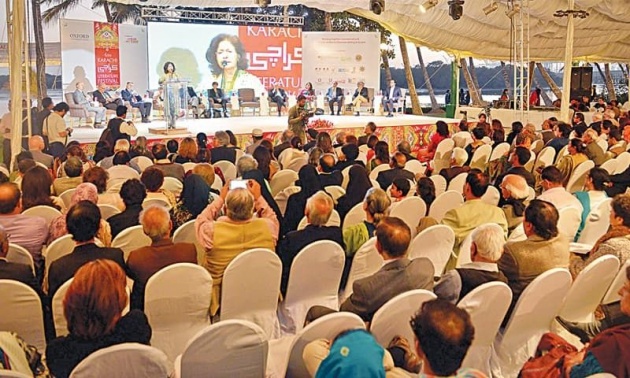KARACHI: The mildly nippy winter evening somehow gelled well with the two warm keynote speeches as the three-day 6th Karachi Literature Festival commenced at the Beach LUXURY HOTEL on Friday.
on Friday.
First it was Indian fiction writer Nayantara Sahgal, niece of Pandit Jawaharlal Nehru, who poured her heart out to book lovers in a talk that gave away her concern for writers and creative artists. Then the inimitable Urdu poet Zehra Nigah, in her lyrical prose, delivered a thought-provoking speech highlighting the importance of book reading.
Ms Sahgal said while preparing for her address she wondered as to what should be its working title. It struck her that Douglas Reed’s book ‘Insanity Fair’ that dealt with the war and politics of his time (1940) would serve her purpose. The book was relevant, because while literature was celebrated at festivals, literature and creative arts were in danger. Writers were up against threat and intimidation; they were under a vicious attack, she said.
6th Karachi Literature Festival gets under way
Ms Sahgal gave the examples of Indian painter M.F. Husain who was forced into exile after his paintings were vandalised. The other example was of Tamil writer Perumal Murugan. The right wing intolerant Hindus objected to one of his novels, because of which he had to give up writing at his creative peak. Recently, at a literature festival in Chennai, she said, she proposed that writers form a group to speak out in support of Mr Murugan.
Trying to understand as to why this happened, Ms Sahgal said imagination was writers’ prized possession; they continued to celebrate art and literature, continued to enjoy diversity and value each other’s individual vision and continued to understand the importance of being different from one another. However, she lamented that words were losing their meaning and only those who dealt in words could restore to words their meaning. She herself had a brush with censorship.
Ms Sahgal said all writing was political. Earlier, politics did not break into private lives, but in the 20th and 21st centuries politics started to affect private lives, which meant one more human experience for imagination to draw on. In this regard, she mentioned the likes of Arthur Miller, Harold Pinter, Faulkner and Latin American and South African writers. Similarly, she said, novels by Pakistani, Afghan and Nigerian writers spoke of the writers’ engagement with the times they lived in.
“Every culture is the result of cross fertilisation by other cultures,” said Ms Sahgal. She added she lived in north India and was heir to an Islamic heritage. Elaborating, she said after independence, while deciding as to how many languages should be considered as official languages of India, a list of 13 was drawn up. She added the list didn’t have Urdu. When Jawaharlal Nehru asked as to why Urdu was excluded, an official told him that it was nobody’s mother tongue, to which Nehru replied it was his mother tongue, and Urdu was added to the list.
Talking about her cultural identity, she said it had elements of Islam, Christianity, Hinduism, Buddhism and atheism and could never be reduced to anything simpler.
Ms Sahgal said writing had always crossed borders, but in recent times writers too had started doing that as a result of which a flood of literature was being produced. She added there was a need for change, but the battle for change could only be fought on one’s own soil.
She also touched upon the fact that writing had become a bit of a horse race for prizes.
Ms Nigah began her speech by commending the organisers of the festival and claimed that now the event had, apart from having literary import, assumed historical significance. She said one of her friends, who lived in the West, always gave her masheeni tuhfey (gadgets). The last one she received only needed a touch to display books, she was told. To which she responded that machines had already ruined the world of care and affection (ahsaas-i-murawwat) and now they were after the quest of knowledge (justuju-i-ilm). She said that the gadgets could never replace the sweet smell of books and the gentle sound of paper rustling when one turned a page.
Ms Nigah said she had grown up with books and still held them dear. Her relationship with them could never turn old. Even in present times people liked reading books. But, she emphasised, in the past even those who belonged to varied professions (doctors, lawyers, bureaucrats etc) would have a profound interest in literature. Back then boys used to woo girls with books, and underlined a meaningful phrase or line. Sadly, that was not the case anymore. This reminded her of a young girl who had once asked her as to why Indira Gandhi married Mahatma Gandhi. She was so disappointed at the girl’s lack of knowledge that instead of telling her that the two Gandhis had no family relations, she told her that sometimes the decision to get married numbed one’s mind.
Earlier, Ameena Saiyid, Asif Farrukhi, Ghazi Salahuddin, the ambassador of Italy, the ambassador of Germany, the US consul-general in Karachi and the British Council (Sindh and Balochistan) director addressed the audience which had turned up in a big number despite the fact that there was no session on the first day.Between the speeches, two awards were also given. The award for the best book in fiction for 2015 was given to the novel Survival Tips for Lunatics by Shandana Minhas. The award for the best non-fiction book went to Ottoman Turkey, Ataturk and Muslim South Asia: Perspectives, Perceptions and Responses by M. Naeem Qureshi.




